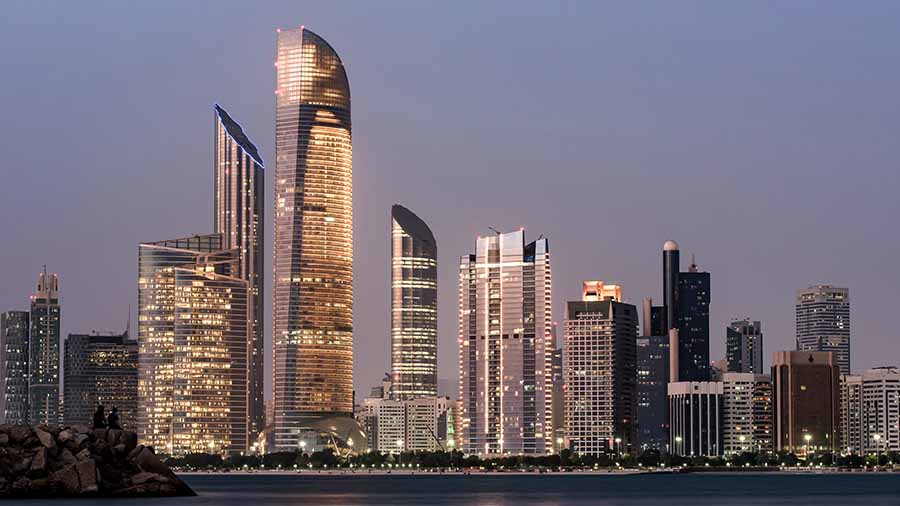Understanding the legal landscape
Historically, the UAE’s business laws required foreign investors to partner with local sponsors who held a 51 percent stake in onshore businesses. However, in June 2021, the UAE enacted a transformative amendment to this ownership requirement, allowing full foreign ownership of onshore companies across most sectors. This change has significantly lowered barriers for international entrepreneurs and companies, simplifying entry into the UAE market and aligning the country with global investment standards.
According to the 2019 Global Competitiveness Index Report by the World Economic Forum (WEF), the UAE ranks as the most competitive economy in the Middle East and North Africa (MENA) region. Key contributors to this ranking include the UAE’s advanced transportation infrastructure, stable economic environment, and highly developed product market. The country’s proactive adoption of information and communication technologies further enhances its appeal, adding to its long-standing advantages in logistical and operational efficiency.
In addition to regulatory reforms, the UAE offers a range of business incentives that make it a unique environment for growth. There are no restrictions on profit transfers or capital repatriation, allowing investors flexibility in managing their earnings. The absence of corporate and personal income taxes for most businesses further enhances profitability, making the UAE an attractive choice for international firms. Moreover, the UAE dirham is stable, secure, and pegged to the U.S. dollar, adding an element of financial stability to business operations. Low import duties and competitive labor costs also support the UAE’s appeal as a strategic business location.
Benefits of doing business without an entity
- Reduces startup costs by eliminating licensing, office, and local sponsorship fees.
- Frees up capital for growth, talent, or strategic investments.
- Enables remote operations and easy scalability without infrastructure constraints.
- Allows quick market adaptation and streamlined relocation if needed.
- Provides entry to the UAE’s dynamic economy without significant initial investment.
- Allows market testing and client connections before committing to a full setup.
Operating without a physical office
For those interested in operating in the UAE without a traditional office, there are flexible alternatives that allow businesses to meet legal requirements while reducing overhead.
Flexi-desk and virtual office packages
- A Flexi-desk provides businesses with a shared workspace or desk that can be used as needed, along with a legally recognized business address. This option meets UAE regulations for business registration and allows companies to use the desk space periodically for meetings or work.
- A virtual office package offers a registered address, mail-handling services, and access to meeting rooms, but without the need for a physical, permanent office. This arrangement is ideal for remote operators who need a UAE address and professional presence without frequent physical presence.
To secure one, business owners can select a package from the relevant free zone authority, which typically includes visa sponsorship and licensing services.
Using third-party office addresses
An alternative to flexi-desk and virtual offices is using a third-party address through a registered agent. These agents offer their business address as the official address for your company, helping you comply with UAE regulations without leasing an office. This option is legally recognized and provides an affordable way to establish a business address.
Numerous licensed agencies in Dubai and across the UAE offer services such as, access to a business address and additional services, such as mailbox rentals and basic paperwork management .
By utilizing flexible office solutions like Flexi-Desk, virtual offices, or third-party addresses, companies can maintain legal compliance, build a professional presence in the UAE, and enjoy cost savings compared to traditional office setups.
Utilizing Free Zones
Free zones allow businesses to retain 100 percent foreign ownership, avoid local sponsorship requirements, and benefit from tax exemptions on corporate income and profits. Each free zone operates under its own regulatory authority, known as a Free Zone Authority (FZA), which manages licensing and oversees compliance. For entrepreneurs and companies looking to test the UAE market without a full onshore entity, free zones offer a practical and efficient entry point.
Major Free Zones in the UAE
The UAE has more than 40 free zones, each catering to specific sectors or industries. Here are some of the largest and most notable:
- Jebel Ali Free Zone (JAFZA): Known for logistics and trade, located near Dubai’s main seaport.
- Dubai Media City and Dubai Internet City: Hubs for media and technology companies with a range of digital services and networking opportunities.
- Sharjah Airport International Free Zone (SAIF-Zone): Popular for manufacturing, offering excellent connectivity via Sharjah’s airport.
- Khalifa Industrial Zone Abu Dhabi (KIZAD): Supports large-scale industrial and logistics activities with extensive warehousing facilities.
- TwoFour54 (Abu Dhabi Media Zone): Focused on media and entertainment, offering production facilities and content creation support.
Each free zone offers tailored packages and incentives, often including access to industry-specific resources, networking opportunities, and infrastructure, allowing companies to select a zone that aligns with their business model.
Business activities allowed in Free Zones
Free zones are ideal for a range of service-oriented and digital businesses that don’t require a physical workspace. Flexi-Desk and virtual office options allow consulting firms, digital marketing agencies, IT companies, and freelance professionals to operate cost-effectively. These options meet regulatory requirements while providing flexibility and reduced overhead.
Although free zones allow businesses to conduct international trade freely, trading directly within the UAE mainland is restricted. To sell products or services in the UAE outside the free zone, companies must partner with a local distributor, commercial agent, or establish an onshore entity.
Consultancy and professional services
Freelancers and independent consultants have a unique opportunity to establish a presence in the UAE without a full-fledged company. Several UAE free zones, such as Dubai Knowledge Park and Fujairah Creative City, offer flexible freelance and consultancy packages that allow individuals to operate under a professional license. These packages provide essential benefits, such as visa sponsorship and access to shared workspaces, enabling professionals to work remotely or from flexible office solutions.
Requirements for obtaining a professional license
The general steps for obtaining a professional license in the UAE include:
- Applicants must submit their credentials and professional experience, typically requiring proof of qualifications or relevant certifications.
- After initial approval, additional documents such as passport copies, educational certificates, and a portfolio of past projects may be required.
- Fees vary by free zone. The entire process is typically handled by the chosen free zone authority, making it streamlined and accessible for independent professionals.
Examples of eligible professions
Many professions are eligible for professional licensing in the UAE, including:
- Qualified engineers and architects can offer design, consulting, and project management services.
- Business advisors, financial consultants, and risk management experts can work independently, serving corporate clients.
- Specialists in technology, digital marketing, and data analysis have strong demand across industries in the UAE.
- Photographers, writers, and designers can also acquire freelance permits, especially through media-focused free zones like Dubai Media City.
Employer of Record (EOR)
For companies seeking to expand their footprint in the UAE without establishing a local entity, Employer of Record (EOR) services offer an efficient, cost-effective solution.
How EOR services work
- The EOR becomes the official employer for the workforce, managing legal responsibilities such as employment contracts, tax compliance, and adherence to UAE labor regulations. By doing so, the EOR minimizes risks associated with local employment laws, freeing companies from the complexity of regulatory compliance.
- EOR services typically encompass payroll management, benefits administration, visa sponsorship, and employee insurance. The EOR also handles onboarding, leaves, and other HR duties, allowing businesses to focus on strategic operations without the distraction of HR administration.
- With an EOR, companies can enter the UAE market and start hiring within weeks rather than months. Since there’s no need to establish an office or set up a legal entity, companies avoid substantial overhead and startup costs.
Benefits of using an EOR in the UAE
- EOR services allow companies to build a local team and enter the market with minimal expense, making it ideal for businesses that want a lean, cost-effective expansion strategy.
- An EOR can onboard employees within weeks, allowing businesses to start operations and scale quickly.
- EOR providers handle payroll, benefits, and other HR tasks, freeing businesses from the need to develop internal HR infrastructure.
- The EOR manages all legal and regulatory requirements, ensuring that employment practices align with UAE laws.
How to legally operate without a physical presence
For investors and business owners looking to enter the UAE market without establishing a traditional business entity, the UAE offers several pathways through specialized permits, licenses, and free zone options. These allow individuals and companies to engage in business activities legally without the full commitment of creating a formal company structure.
In recent years, the UAE has simplified its processes to attract a range of investors who can now legally operate without needing a full legal entity. Through specialized free zones and independent permits, investors can pursue a flexible, low-cost entry into the UAE while adhering to regulatory requirements. Free zones, in particular, offer freelancer, consulting, trading, and branch licenses designed to meet the needs of diverse business models.
Step-by-step guide on applying for necessary licenses or permits
Choose the right Free Zone
The UAE has over 40 free zones, each with unique benefits. Selecting a free zone that aligns with your business type is crucial. For instance:
- Consultants might prefer Dubai Knowledge Park or Fujairah Creative City.
- Trading companies can explore options like Jebel Ali Free Zone, which facilitates import/export activities.
- Service providers such as tech companies can look into Dubai Internet City, which supports digital businesses.
Select the appropriate license category
Depending on the nature of your business, choose a license that fits. Common categories include:
- Freelance Licenses: For individuals offering consulting or creative services.
- Trading Licenses: For businesses importing, exporting, or selling products.
- Service Licenses: For companies providing specialized services.
- Branch Licenses: For existing foreign companies that want to establish a UAE presence without creating a separate entity.
Prepare Required Documentation
Documentation requirements vary but typically include:
- Passport copies of the owner(s)
- Proof of qualifications or business expertise
- Business plan (for certain license types, especially trading and service-based businesses)
- Lease agreements or office-sharing arrangements if a physical presence is needed
Submit the Application
Most applications are submitted directly to the free zone authority, either online or in person. Some free zones have fast-tracked application services, which can speed up the process and reduce waiting times for investors eager to start operations quickly.
Pay License Fees
License fees vary by free zone and license type. Basic trading and service licenses can range between AED 10,000 to AED 15,000 per year, depending on the services included. Certain business activities may require additional approvals or permits from relevant UAE authorities, especially for businesses engaged in health, finance, or engineering. It’s essential to consult the free zone to confirm if these apply to your industry.
Once the license is granted, investors can begin operations, sign contracts, invoice clients, and conduct other business activities allowed by their license. In many cases, free zones also offer virtual office packages and mail handling, helping maintain a local presence.











